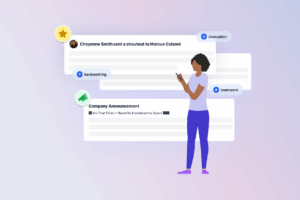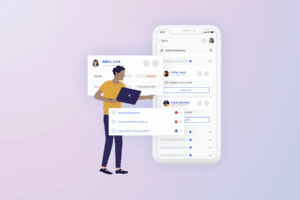Share
Dealership culture transformation has become essential for automotive retailers facing unprecedented industry disruption and evolving workforce expectations. As traditional automotive business models adapt to digital transformation, electric vehicle adoption, and changing consumer behaviors, dealerships must simultaneously evolve their workplace cultures to attract, retain, and engage the talent needed for future success.
The automotive industry’s engagement scores currently rank in the bottom 40% compared to other industries, with an average employee Net Promoter Score (eNPS) of 10, placing it in the bottom 14% across all sectors. This data underscores the urgent need for comprehensive culture transformation initiatives that address fundamental workplace satisfaction and employee experience challenges.
Successful dealership culture transformation goes beyond superficial changes to address core organizational values, leadership practices, communication systems, and employee development programs. According to industry research, a strong company culture is more than just a buzzword—it’s the foundation of a successful dealership, with 77% of adults considering a company’s culture before applying for a job, and 56% stating they wouldn’t work for a company with a bad reputation.
Understanding the Need for Culture Transformation
Dealership culture transformation has become critical as the automotive industry faces multiple simultaneous disruptions requiring adaptive, resilient organizational cultures.
Industry Disruption and Cultural Impact
The automotive sector is experiencing seismic shifts that directly impact workplace culture and employee expectations.
Technology Integration Challenges: The integration of artificial intelligence, digital platforms, and advanced automotive technologies creates new skill requirements and workflow changes that traditional dealership cultures may resist. As one industry report notes, “AI will evolve from a collection of task-specific tools into the foundational layer that connects and unifies the entire dealership technology stack.”
Generational Workforce Shifts: With an aging workforce in automotive production averaging over 40 years old, dealerships must adapt their cultures to attract younger generations who prioritize different workplace values including work-life balance, professional development, and technology integration.
Market Pressure and Performance Demands: Despite these pressures, more than 70% of surveyed dealers expect vehicle sales growth to continue in 2025, creating tension between maintaining performance while implementing cultural changes necessary for long-term sustainability.
Cultural Barriers to Transformation
Traditional automotive cultures often present specific obstacles that must be addressed systematically.
Legacy Leadership Approaches: Traditional command-and-control management styles that worked in previous automotive eras may hinder the collaborative, adaptive cultures needed for modern retail success.
Resistance to Change: People in automotive organizations show concerning patterns regarding change implementation, with survey data revealing that employees are “most negative towards ‘I have seen positive changes taking place based on recent employee survey results’ with 17% of people disagreeing.”
Departmental Silos: Traditional dealership structures create departmental isolation that inhibits the cross-functional collaboration necessary for modern customer experience delivery and operational efficiency.
Core Elements of Successful Culture Transformation
Effective dealership culture transformation requires systematic attention to foundational elements that shape employee experience and organizational performance.
Leadership Development and Accountability
Leadership transformation forms the cornerstone of successful culture change initiatives.
Executive Commitment and Modeling: Senior leadership must demonstrate genuine commitment to cultural change through their actions, decisions, and resource allocation. Cultural transformation fails when leadership pays lip service to change while maintaining traditional practices.
Management Training and Development: Middle management often represents the biggest barrier to culture change, requiring comprehensive training in new leadership approaches, communication skills, and change management techniques.
Performance Management Integration: Implementing automotive performance management systems that align individual goals with cultural values helps reinforce desired behaviors and hold leaders accountable for culture development.
Communication and Transparency
Effective communication systems enable culture transformation by building trust and ensuring consistent messaging across all organizational levels.
Regular Feedback Mechanisms: Establishing systematic feedback collection through employee surveys, focus groups, and regular check-ins helps identify cultural issues and track transformation progress.
Transparent Decision-Making: Sharing information about business performance, strategic decisions, and change initiatives builds trust and helps employees understand how their work contributes to organizational success.
Multi-Directional Communication: Creating channels for upward, downward, and lateral communication ensures that all voices are heard and valuable insights from front-line employees reach decision-makers.
Employee Engagement and Development
High-performance cultures prioritize employee growth and engagement as fundamental business strategies.
Professional Development Programs: Comprehensive car dealership training programs that enhance both technical skills and soft skills demonstrate organizational investment in employee futures while building capabilities needed for business success.
Career Pathing and Advancement: Clear career progression opportunities help employees envision their futures within the organization, improving retention while building internal talent pipelines for leadership positions.
Recognition and Appreciation: Systematic recognition programs that celebrate both individual achievements and team accomplishments help build positive workplace cultures that motivate continued high performance.
Strategic Framework for Culture Transformation
Successful dealership culture transformation requires systematic approaches that address organizational culture as a strategic business initiative.
Assessment and Baseline Establishment
Understanding current culture provides the foundation for effective transformation planning.
Culture Assessment Tools: Comprehensive culture assessments using validated instruments help identify current state strengths and weaknesses while establishing baseline metrics for measuring transformation progress.
Employee Experience Mapping: Detailed mapping of employee experiences from recruitment through career development helps identify specific touchpoints where culture improvements can have maximum impact.
Stakeholder Input Collection: Gathering input from employees, customers, and business partners provides multiple perspectives on current culture strengths and improvement opportunities.
Vision Development and Goal Setting
Clear cultural vision and specific goals provide direction and measurable outcomes for transformation efforts.
Cultural Values Definition: Developing clear, actionable cultural values that align with business strategy and employee expectations creates the foundation for all transformation activities.
Behavioral Standards: Translating cultural values into specific behavioral expectations helps employees understand how to embody desired culture in their daily work activities.
Success Metrics: Establishing measurable outcomes for culture transformation helps track progress and demonstrate return on investment for culture initiatives.
Implementation Planning and Execution
Systematic implementation ensures culture transformation efforts create sustainable change rather than temporary improvements.
Phased Rollout Strategy: Implementing culture changes in phases allows for testing, refinement, and adjustment based on early results and employee feedback.
Change Champion Networks: Identifying and developing change champions throughout the organization helps build grassroots support for transformation while providing peer-to-peer influence.
Resource Allocation: Dedicating appropriate financial and human resources to culture transformation demonstrates organizational commitment while ensuring adequate support for success.
Technology’s Role in Culture Transformation
Modern technology solutions can significantly accelerate and support culture transformation initiatives while improving operational efficiency.
Digital Communication and Collaboration
Technology platforms can enhance communication and collaboration essential for positive workplace cultures.
Integrated Communication Systems: Implementing comprehensive HR software for car dealerships provides centralized communication platforms that improve information sharing and reduce communication barriers.
Mobile Accessibility: Mobile-enabled platforms ensure all employees can access information and participate in communication regardless of their physical location or work schedule.
Social Recognition Platforms: Digital recognition systems facilitate peer-to-peer appreciation and public acknowledgment of achievements, building positive culture through regular positive interactions.
Data-Driven Culture Management
Analytics and measurement tools help organizations track culture transformation progress and make data-informed decisions.
Employee Experience Analytics: Advanced analytics platforms can identify patterns in employee satisfaction, engagement, and retention that inform targeted culture improvement initiatives.
Performance Correlation Analysis: Analyzing relationships between culture metrics and business performance helps demonstrate the value of culture investments while identifying areas for focused attention.
Predictive Insights: Machine learning applications can help predict employee satisfaction trends and identify early warning signs of culture problems before they impact retention or performance.
Addressing Specific Cultural Challenges
Dealership culture transformation must address industry-specific challenges that impact workplace satisfaction and business performance.
Work-Life Balance and Flexibility
Automotive retail’s traditional scheduling demands require innovative approaches to work-life balance.
Flexible Scheduling Solutions: Implementing car dealership scheduling software can help create more flexible work arrangements while maintaining necessary coverage for customer service requirements.
Remote Work Opportunities: Identifying positions that can accommodate remote or hybrid work arrangements helps attract talent who value flexibility while maintaining operational requirements.
Family-Friendly Policies: Developing policies that support employees with family responsibilities demonstrates organizational understanding of work-life balance importance.
Diversity, Equity, and Inclusion
Creating inclusive cultures that welcome diverse perspectives enhances both employee satisfaction and business performance.
Inclusive Hiring Practices: Implementing comprehensive automotive recruitment strategies that actively seek diverse candidates helps build inclusive teams while accessing broader talent pools.
Mentorship and Sponsorship Programs: Formal programs that support career development for underrepresented groups help build inclusive advancement opportunities while developing leadership pipelines.
Cultural Competency Training: Regular training on diversity, inclusion, and cultural competency helps all employees contribute to welcoming workplace environments.
Performance and Accountability Culture
Building cultures that balance high performance expectations with employee support and development.
Clear Expectations and Standards: Establishing transparent performance expectations and behavioral standards helps employees understand success requirements while maintaining accountability.
Continuous Feedback Systems: Regular feedback and coaching conversations help employees improve performance while feeling supported in their development efforts.
Learning from Mistakes: Creating cultures that view mistakes as learning opportunities rather than failure encourages innovation and risk-taking essential for business growth.
Role-Specific Culture Considerations
Different positions within dealerships require tailored culture approaches that address unique role challenges and motivations.
Sales Team Culture Development
Sales environments present particular culture challenges due to competitive pressures and commission-based compensation.
Collaborative Competition: Building cultures that maintain healthy competition while encouraging team collaboration and mutual support improves both individual and team performance.
Customer-Focused Values: Emphasizing customer satisfaction and relationship building over purely transactional approaches creates more sustainable sales cultures and better customer experiences.
Professional Development Support: Providing ongoing sales training and career development opportunities demonstrates investment in sales professionals while improving their capabilities and job satisfaction.
Service Department Culture
Technical service areas require cultures that balance efficiency with quality and customer service.
Technical Excellence Recognition: Acknowledging and celebrating technical expertise and problem-solving capabilities helps build pride and engagement among service professionals.
Continuous Learning Culture: Supporting ongoing technical training and certification programs keeps service teams current with evolving automotive technology while demonstrating organizational investment in their expertise.
Safety and Quality Focus: Emphasizing safety protocols and quality standards creates cultures that protect employees while delivering exceptional customer service.
Management and Leadership Culture
Leadership culture sets the tone for entire organizations and requires special attention during transformation efforts.
Servant Leadership Principles: Training managers to focus on employee development and support rather than purely directive approaches builds trust and engagement throughout the organization.
Decision-Making Transparency: Involving managers in strategic discussions and decision-making processes helps them understand business context while building their leadership capabilities.
Accountability and Support Balance: Creating expectations for management accountability while providing support and resources for success builds effective leadership cultures.
Measuring Culture Transformation Success
Effective measurement systems help organizations track culture transformation progress and identify areas requiring additional attention.
Employee Experience Metrics
Comprehensive employee experience measurement provides insights into culture transformation effectiveness.
Engagement Survey Results: Regular employee engagement surveys using validated instruments provide quantitative measures of culture transformation progress and employee satisfaction changes.
Retention and Turnover Analysis: Monitoring car dealership employee turnover rates and conducting exit interview analysis helps identify culture issues and track improvement over time.
Employee Net Promoter Score: Tracking employee willingness to recommend the organization as an employer provides insights into overall culture strength and reputation.
Business Performance Correlation
Connecting culture metrics with business performance demonstrates the value of culture transformation investments.
Customer Satisfaction Correlation: Research consistently shows strong correlations between employee engagement and customer satisfaction, making customer metrics important indicators of culture success.
Productivity and Efficiency Measures: Tracking operational metrics alongside culture measures helps identify performance improvements that result from positive culture changes.
Financial Performance Impact: Analyzing relationships between culture metrics and financial performance helps quantify the return on investment for culture transformation initiatives.
Leading and Lagging Indicators
Balanced measurement systems include both leading indicators that predict future culture success and lagging indicators that measure achieved results.
Leading Indicators:
- Manager training completion rates
- Employee participation in development programs
- Internal promotion rates
- Communication platform engagement
Lagging Indicators:
- Employee satisfaction scores
- Retention rates
- Customer satisfaction ratings
- Business performance metrics
Sustaining Culture Transformation
Long-term culture transformation success requires systematic approaches to sustainability and continuous improvement.
Continuous Improvement Processes
Culture transformation is an ongoing process rather than a one-time initiative requiring continuous attention and refinement.
Regular Culture Assessments: Conducting periodic culture assessments helps identify emerging issues and track long-term transformation progress while informing strategy adjustments.
Feedback Integration: Systematic processes for collecting and acting on employee feedback demonstrate organizational responsiveness while enabling continuous culture refinement.
Best Practice Sharing: Creating mechanisms for sharing successful culture practices across departments and locations helps accelerate transformation while building organizational learning capabilities.
Leadership Development and Succession
Sustainable culture transformation requires ongoing leadership development that maintains cultural values through leadership transitions.
Cultural Leadership Competencies: Defining specific leadership competencies that support desired culture helps guide leadership selection, development, and succession planning.
Succession Planning Integration: Incorporating cultural fit and leadership into succession planning ensures that future leaders will maintain and strengthen desired culture characteristics.
Ongoing Leadership Development: Continuous leadership development programs help current and future leaders maintain culture focus while developing capabilities needed for evolving business requirements.
Adaptation and Evolution
Successful cultures maintain core values while adapting to changing business requirements and employee expectations.
Environmental Scanning: Regular assessment of industry trends, workforce changes, and business requirements helps identify culture adaptation needs before they become urgent problems.
Flexible Culture Framework: Building culture frameworks that maintain core values while allowing adaptation to changing circumstances helps organizations remain relevant and effective.
Innovation and Experimentation: Encouraging culture innovation and experimentation helps organizations discover new approaches to employee engagement and satisfaction.
Technology Integration for Culture Transformation
Modern technology solutions provide powerful tools for accelerating and sustaining culture transformation initiatives.
Digital Culture Platforms
Technology platforms can enhance culture transformation by improving communication, recognition, and employee experience.
Employee Experience Platforms: Comprehensive platforms that integrate communication, recognition, development, and feedback provide centralized culture management capabilities.
Mobile-First Solutions: Mobile-enabled culture platforms ensure all employees can participate in culture initiatives regardless of their work location or schedule.
AI-Powered Insights: Artificial intelligence applications can identify culture trends, predict satisfaction issues, and recommend interventions before problems impact performance.
Learning and Development Technology
Digital learning platforms accelerate culture transformation by making development opportunities more accessible and engaging.
Microlearning Platforms: Bite-sized learning opportunities fit busy dealership schedules while providing continuous culture and skill development.
Virtual Reality Training: Immersive training experiences can help employees practice new behaviors and understand different perspectives essential for culture transformation.
Social Learning Networks: Platforms that enable peer-to-peer learning and knowledge sharing build collaborative cultures while accelerating skill development.
Future Trends in Dealership Culture
Understanding emerging trends helps organizations prepare for future culture requirements and opportunities.
Generational Workplace Evolution
Changing workforce demographics require culture adaptations that appeal to multiple generational preferences.
Digital Native Expectations: Younger employees expect sophisticated technology integration and digital-first communication approaches that older workplace models may not provide.
Purpose-Driven Work: Emerging workforce generations prioritize meaningful work and social responsibility, requiring culture frameworks that connect individual contributions to larger purposes.
Continuous Learning Culture: Rapid technological change requires cultures that embrace continuous learning and adaptation as fundamental organizational capabilities.
Remote and Hybrid Work Integration
Post-pandemic workplace expectations include flexibility options that traditional automotive retail may need to accommodate creatively.
Virtual Culture Building: Developing capabilities for building and maintaining culture across remote and in-person work arrangements becomes essential for attracting diverse talent.
Digital Collaboration Skills: Building organizational capabilities for effective digital collaboration ensures culture strength regardless of physical work arrangements.
Outcome-Based Performance: Shifting from time-based to outcome-based performance management supports flexible work arrangements while maintaining accountability.
Implementation Best Practices
Successful dealership culture transformation requires attention to implementation details that determine long-term success.
Change Management Fundamentals
Effective change management principles ensure culture transformation efforts achieve sustainable results.
Communication Strategy: Developing comprehensive communication strategies that explain the need for change, the vision for future culture, and individual roles in transformation helps build support and participation.
Resistance Management: Identifying and addressing sources of resistance through education, involvement, and support helps minimize transformation obstacles while building buy-in.
Quick Wins Strategy: Implementing early, visible improvements helps build momentum for longer-term transformation while demonstrating organizational commitment to change.
Resource Allocation and Support
Adequate resources and support systems enable successful culture transformation implementation.
Budget and Staffing: Allocating appropriate financial and human resources demonstrates organizational commitment while ensuring adequate support for transformation activities.
External Support: Engaging culture transformation consultants and experts provides specialized knowledge and objective perspectives that accelerate transformation success.
Training and Development Investment: Comprehensive training programs for leaders and employees provide the skills and knowledge necessary for successful culture transformation.
Timeline and Milestone Planning
Realistic timeline and milestone planning helps maintain momentum while allowing for adjustment based on progress and feedback.
Phased Implementation: Breaking culture transformation into manageable phases allows for learning and adjustment while maintaining progress toward overall goals.
Milestone Celebration: Recognizing and celebrating transformation milestones helps maintain momentum while reinforcing the value of culture change efforts.
Adjustment Flexibility: Building flexibility into implementation plans allows for course corrections based on feedback and changing circumstances without abandoning overall transformation goals.
Building a Thriving Dealership Culture
Dealership culture transformation represents both a critical business imperative and a significant opportunity for automotive retailers navigating industry disruption. The challenges facing today’s dealerships—from technology integration to workforce changes to evolving customer expectations—require adaptive, resilient cultures that can evolve while maintaining operational excellence.
Successful culture transformation requires systematic approaches that address leadership development, communication systems, employee engagement, and performance management in integrated ways. The investment in culture transformation pays dividends through improved employee satisfaction, reduced turnover, enhanced customer experiences, and stronger business performance.
The automotive industry’s current culture challenges create opportunities for dealerships that commit to comprehensive transformation initiatives. Organizations that prioritize culture development while maintaining focus on business results position themselves for sustainable success in an increasingly competitive and dynamic market environment.
The future of automotive retail belongs to organizations that can balance technological innovation with human-centered cultures that attract, develop, and retain the talent necessary for long-term success. Dealership culture transformation provides the foundation for building these high-performance organizations capable of thriving in the evolving automotive landscape.
Related articles

Introducing HR Reporting with AI that Can Actually Impact Your Bottom Line

The Real ROI of Streamlining HR and Payroll

Tasks & Workflows: Innovating Automation for HR

